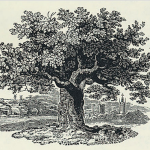Raritan Township was in the news not long ago for its effort to acquire and preserve a 48-acre farm to the west of Flemington. It is located near an area that has long been known as “Hardscrabble.”
Flemington’s First Bank
My last article described the political turmoil in Hunterdon County in the 1850s. There was another kind of turmoil going on at the same time, an economic one. For Hunterdon that meant a local bank was needed.
The Housel Family Tree

I first came upon the Housel family while researching early families and their properties in old Amwell Township. Later on, I found Ann Housel, wife of Flemington banker John C. Hopewell (see “One Man Makes a Difference.”) The family is a very old one in Hunterdon County.
Choosing Sides
My previous article discussed the evolution of political parties in the early 1850s, both nationally and in Hunterdon County. The Democratic party was still going strong, while the Whig party was fading away and two new parties had come on the scene: the Republican party and the American party, better known as the Know Nothings.
Political Turmoil
Hunterdon County Politics in the 1850s
I am going to step away briefly from the life of John C. Hopewell to shed some light on a political movement that Hopewell and many other Flemington notables got caught up in.
Lair/Lare Family Tree
The second generation of this Lair Family tree came to New Jersey came from Germany in the mid-18th century, after the death of the patriarch in Lyons, France. The widow and her sons came to Hunterdon County in 1757, but settled in different places, one in the northern county and the other in the southern. The name is usually spelled Lair, but sometimes as Lare.
Myers Family Tree
Bonnell Tree
One Man Makes a Difference
Downtown Flemington, part two
John C. Hopewell
From about 1855 until his death in 1888, a one-time hatter’s apprentice brought the village of Flemington into the modern era by providing an improved public water system, street lighting with gas instead of candles, a functioning fire company, improved streets and sidewalks, and more.
Hunterdon Businesses in 1850
One never knows when an article by Egbert T. Bush might come in handy. In this case, it turns out to be very handy for the research I am doing on Flemington in the 19th century.
